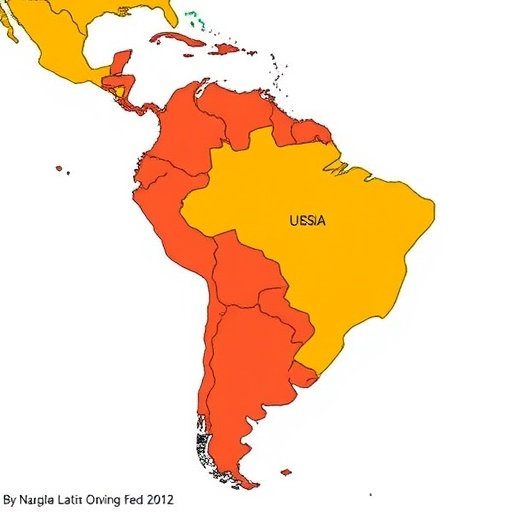In an illuminating new scoping review published in the International Journal for Equity in Health, a multidisciplinary team led by Ríos-Quituizaca, P., Endara-Mina, J., Ramos-Avasola, S., and colleagues have shed critical light on the persistent ethnic disparities influencing contraceptive access and use across Latin America and the Caribbean. This comprehensive investigation, emerging amid an intensifying global conversation about health equity, systematically maps the extant literature to unpack how ethnic identities intersect with reproductive health services, underscoring patterns of inequality that have profound implications for public health policy and social justice in the region.
This review arrives at a time when Latin America and the Caribbean remain some of the most ethnically diverse yet socioeconomically stratified regions globally, characterized by complex histories of colonization and marginalization. The authors meticulously examine a broad spectrum of studies, synthesizing data that reveal entrenched ethnic inequalities in contraception — a factor not merely symbolic of reproductive rights but a powerful lever influencing maternal health outcomes, gender equity, and broader socioeconomic well-being.
At the core of this research lies a robust interrogation of how indigenous, Afro-descendant, and other marginalized ethnic groups encounter multifaceted barriers in contraceptive access. These barriers are not solely logistical but also deeply embedded in systemic discrimination, cultural alienation, and health service structures that often fail to acknowledge or respect the unique needs and cultural paradigms of diverse communities. The review analyses intersectional factors including geographic isolation, socioeconomic status, education, and gender norms that compound these inequalities.
Technically speaking, the review employs a scoping methodology designed to identify gaps and map the landscape of existing research rather than to quantify effects through meta-analysis. This methodological choice allows the authors to capture a wide range of qualitative and quantitative studies, policy documents, and grey literature, thus providing a panoramic view of the disparities and potential areas for intervention. The data extraction process is detailed and systematic, enabling the authors to highlight the heterogeneity and complexity of contraceptive use patterns by ethnicity across different countries.
The synthesis unearths that indigenous populations consistently report lower levels of contraceptive use compared to non-indigenous groups, a disparity fueled by limited access to culturally appropriate sexual health education and services. Language barriers and mistrust towards mainstream healthcare providers frequently dissuade these populations from seeking contraceptive counseling, exacerbating risks for unintended pregnancies and associated health complications. Furthermore, the review points out how Afro-descendant communities face unique socio-political challenges, including discrimination and poverty, which hinder effective family planning engagement.
Experts emphasize the critical role of culturally sensitive healthcare interventions, highlighting programs that integrate traditional knowledge and community health workers from within ethnic groups as promising models. The review also draws attention to the influence of national policies, which often inadequately address ethnic specificities or fail to implement legal frameworks supporting equitable reproductive health services. It suggests that while some countries in the region have made legislative strides, enforcement and practical accessibility remain problematic.
The review discusses the intersection of gender dynamics, ethnic discrimination, and health system deficiencies, revealing a compounded marginalization of women from ethnic minorities. These women face additional hurdles such as coercive sterilization practices historically documented in the region and ongoing stigmatization that curtails their reproductive autonomy. Such findings highlight the necessity for a rights-based approach to contraception that prioritizes informed consent and respects cultural identities.
The authors argue for enhanced data collection disaggregated by ethnicity to better monitor and evaluate reproductive health outcomes. The lack of consistent, granular data is a significant obstacle to both research and policy effectiveness, perpetuating invisibility of marginalized groups within health statistics and policy deliberations. Strengthening surveillance systems is thus pivotal for closing the equity gap, ensuring interventions target the populations in greatest need.
In understanding the broader socio-political context, the review connects contraceptive inequalities to entrenched systemic inequities shaped by historical colonial legacies, neoliberal economic policies, and ongoing social exclusion. These macro-level forces influence health infrastructure, funding priorities, and social attitudes, making it clear that addressing ethnic disparities in contraception requires multisectoral collaboration beyond the health sector.
This study also reflects on methodological challenges within the examined literature, notably the scarcity of community-led research and ethnographic studies that center indigenous and Afro-descendant voices. The authors call for participatory research paradigms that empower marginalized communities to co-create knowledge and solutions, fostering trust and relevancy in health interventions.
Importantly, the scoping review extends its implications toward global health frameworks, urging international donors and organizations to integrate ethnic equity considerations into reproductive health programs. It posits that achieving Sustainable Development Goals related to health, gender equality, and reduced inequalities is unattainable without addressing these deep-seated ethnic disparities.
This seminal work represents a crucial step toward illuminating how ethnicity shapes reproductive health trajectories in Latin America and the Caribbean. By systematically mapping inequalities, it provides an evidence base to inform policy reforms, program designs, and advocacy efforts aimed at dismantling the barriers impeding equitable contraceptive access.
The comprehensive nature of the review offers healthcare professionals, policy-makers, researchers, and activists a powerful tool to understand the intersection of ethnicity and contraception from a multidimensional perspective. It challenges stakeholders to confront uncomfortable truths about systemic exclusion and to envision innovative, culturally congruent strategies that uphold the reproductive rights and dignity of all ethnic groups in the region.
Ultimately, the findings underscore the urgent need for inclusive, culturally sensitive reproductive healthcare systems that not only acknowledge but actively respect and incorporate the diverse identities and aspirations of Latin America’s and the Caribbean’s ethnically plural societies. It is a clarion call for equity that champions informed choice, empathetic care, and social justice as pillars of reproductive health.
Subject of Research:
Ethnic inequalities and access to contraception in Latin America and the Caribbean.
Article Title:
Ethnic inequalities and contraception in Latin America and the Caribbean: a scoping review.
Article References:
Ríos-Quituizaca, P., Endara-Mina, J., Ramos-Avasola, S. et al. Ethnic inequalities and contraception in Latin America and the Caribbean: a scoping review. Int J Equity Health 24, 272 (2025). https://doi.org/10.1186/s12939-025-02501-7
Image Credits:
AI Generated




